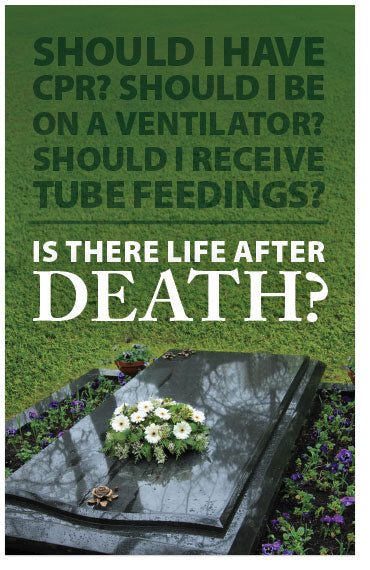Is There Life After Death?
Special-Order Folded Tract
 NOTE: This item is custom-printed to order (click for more details).
NOTE: This item is custom-printed to order (click for more details).
This tract is from our print-on-demand library, and is not kept in stock. Select the options below, and we will custom-print a batch just for you. Because this item is custom-printed, you can add your custom imprint to the back page at no extra cost.
- Estimated shipping date: Thursday, March 26 (Click for more details)
- SKU:
- Discounts: Discount coupons do not apply to this item
- Format: Folded Tract
- Size: 3.5 inches x 5.5 inches
- Pages: 6
- Imprinting: Available with 4 lines of custom text
- Version: NIV
- Returns: Because this item is custom-printed to order, it cannot be returned.
Show all item details
The full text of this tract is shown below in the NIV version. (Do you want to print this tract in a different version than the one listed? Contact us and let us know what you're looking for—we may be able to create the alternate version for you at no charge.)
It has been said that there are many roads that lead to Rome …
Is the same true for God? Does one need to be merely devout, in whatever religion one chooses, to be acceptable to God? Is there an afterlife? These questions are important because ultimately our physical bodies fail us and we all die. The final death rate remains 100% for everyone.
What standard should we use to answer these questions? Do we use our own feelings about what is true and right and what is not? How about traditions? What proof is there that any one opinion is better than another?
Just because I say something does not make it true, and the same applies for what you say. So where do we turn? Is there any objective truth? If I said that George Washington never lived, and he was not the first president of the United States, how could you prove I was right or wrong?
You might start by going to original historical documents and his letters, or even go to his grave site, where a body would be found six feet underground. Similarly, we need to turn to original sources as we search for truth in how to reach God.
The Bible records the life of Jesus …
His life was also recorded by the historian Josephus (AD 37-100). Moreover, the disciples of Jesus wrote letters documenting their eyewitness accounts. But the most important proof is the grave of Jesus. Unlike George Washington’s occupied grave, the tomb of Jesus does not contain His body. The tomb is empty. Does any other person who claimed to teach the truth about life after death have an empty grave? Jesus rose from the dead, giving validity to what He said.
In John 14:6, Jesus said: “I am the way and the truth and the life. No one comes to the Father except through me.” He explicitly said that there was no other way to God, except through Himself. Jesus did not teach religion, but relationship.
Many people think that good deeds and living a good life will bring them to God after physical death. There is only one problem with that.
“good” is not enough …
God is holy, so only perfection is enough if we are to try that route. But even our bad thoughts count against us. Jesus said, if anyone looks lustfully at someone, he or she has committed adultery in his heart (Matthew 5:28). Jesus also said, if someone is angry at an individual (wishing him dead), he or she is guilty of murder (Matthew 5:21-22). Honesty requires us to admit that we are all guilty of either adultery or murder, or both. We cannot forgive our own moral failures or sins and no amount of penance or “making it right” will change our status before a holy God. God does not look the other way at sin: He requires punishment for it. In fact, the Bible tells us in Romans 3:23 that “ALL have sinned.” And in Romans 6:23 there is even worse news: “the wages of sin is death.” The penalty for sin is eternal suffering after physical death (Revelation 21:8). But there is good news. God has provided us with a gift of forgiveness through His Son Jesus.
So what can we do to make sure we will spend eternity with God in heaven after we die? The Bible makes three things clear:
• God loves us immensely (Romans 5:8)
• We must repent (Mark 1:15)
• Faith in Jesus is required (John 3:16)
The purpose of Jesus’ crucifixion was so that His death would be the payment for the sins of those who trust in Him. So now the question becomes, “What is real faith in Jesus?” What does Jesus require to take away my sin? After His resurrection, Jesus gave a mandate to His followers to avoid any miscommunication. True followers of Jesus have a new direction in life. They obey His way of living, regardless of the personal sacrifice, and tell others about Him (Matthew 28:19-20).
Jesus said, “Whoever wants to be my disciple must deny themselves and take up their cross daily and follow me. For whoever wants to save their life will lose it, but whoever loses their life for me will save it. What good is it for someone to gain the whole world, and yet lose or forfeit their very self?” (Luke 9:23-25).
God now offers us a way to have a new relationship with Him, a free gift to us in which He completely forgives all our sin because Jesus has paid the price for it. We receive Him as our leader and forgiver, as the Lord Jesus Christ.
What happens when we are presented with a gift? We may either accept it, or refuse it. By accepting it, you say “yes” to God, that you believe that Jesus’ death was for you—personally. You ask God to forgive your sins, and put your faith in Jesus’ sacrifice, receiving eternal life. This new life will be evidenced as you turn to obediently living for Him. If you choose to accept God’s free gift, then eternal life with God awaits you after your physical death. If not, then eternal suffering awaits you after your physical death (Matthew 25:41).













